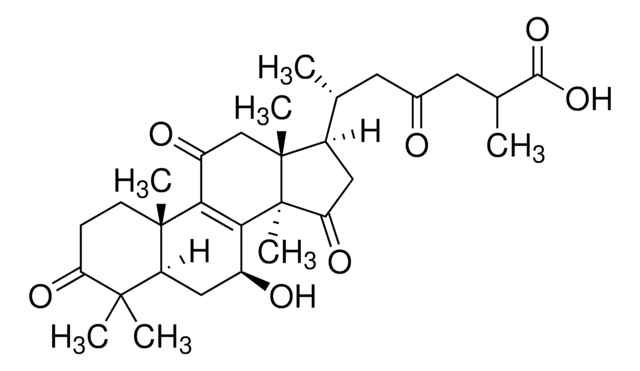SML3612
Ganoderic acid D
≥95% (HPLC)
Synonym(s):
(7β)-7-Hydroxy-3,11,15,23-tetraoxolanost-8-en-26-oic acid, GAD
Sign Into View Organizational & Contract Pricing
All Photos(2)
About This Item
Empirical Formula (Hill Notation):
C30H42O7
CAS Number:
Molecular Weight:
514.65
MDL number:
UNSPSC Code:
12352106
UNSPSC Code:
12352200
NACRES:
NA.21
Recommended Products
Quality Level
Assay
≥95% (HPLC)
form
powder
color
white to beige
solubility
DMSO: 2 mg/mL, clear
storage temp.
-10 to -25°C
Biochem/physiol Actions
Ganoderic acid D is one of major triterpenes isolated from Ganoderma lucidum that exhibit potent anticancer properties. Ganoderic acid D inhibits the energy reprogramming of colon cancer cells including glucose uptake, lactate, and pyruvate and acetyl-coenzyme production through SIRT3 upregulation via acetylated cyclophilin D inhibition.
Storage Class Code
11 - Combustible Solids
WGK
WGK 3
Flash Point(F)
Not applicable
Flash Point(C)
Not applicable
Certificates of Analysis (COA)
Search for Certificates of Analysis (COA) by entering the products Lot/Batch Number. Lot and Batch Numbers can be found on a product’s label following the words ‘Lot’ or ‘Batch’.
Already Own This Product?
Find documentation for the products that you have recently purchased in the Document Library.
Zhendong Liu et al.
European journal of pharmacology, 824, 72-77 (2018-01-29)
Ganoderic acid D (GAD) is a highly oxygenated tetracyclic triterpenoid. This study aims to assess the effects of GAD on the energy metabolism of colon cancer through the regulation of SIRT3 expression and whether this effect is related to acetylated
Ruo-Lin Zhao et al.
Journal of ethnopharmacology, 210, 287-295 (2017-09-09)
Ganoderma lucidum (GL) is an oriental medical fungus, which was used to prevent and treat many diseases. Previously, the effective compounds of Ganoderma lucidum extract (GLE) were extracted from two kinds of GL, [Ganoderma lucidum (Leyss. Ex Fr.) Karst.] and
Qing-Xi Yue et al.
Molecular & cellular proteomics : MCP, 7(5), 949-961 (2008-01-02)
Triterpenes isolated from Ganoderma lucidum could inhibit the growth of numerous cancer cell lines and were thought to be the basis of the anticancer effects of G. lucidum. Ganoderic acid D (GAD) is one of the major components in Ganoderma
Our team of scientists has experience in all areas of research including Life Science, Material Science, Chemical Synthesis, Chromatography, Analytical and many others.
Contact Technical Service





